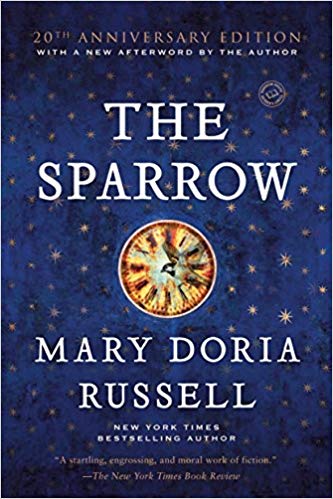In the year 2019, scientists at the Arecibo radio telescope in Puerto Rico searching for extraterrestrial signals, finally succeed. They identify signals from the star Alpha Centauri that are unmistakably artificial. Through clever trials the scientists conclude that the signals are music. Mankind has found another intelligent and technological species.
Alpha Centauri is 4.3 lightyears away, the closest star to our own. A close-knit clique of friends in Arecibo, led by Jesuit priests, decide to launch a human mission in a spaceship to Alpha Centauri. The Jesuits want to meet those other “children of God.”
They build a makeshift spaceship using an asteroid and mining equipment and technology that is capable to accelerate to about 90% of the speed of light within a year, making the trip from Earth to Alpha Centauri take about 17 years, including acceleration, deceleration and mid-cruise coasting. However, due to time dilation at relativistic speeds, the crew only experiences eight months of travel. The idea is that they can go to meet the aliens, spend a few years there, and come back, and be five years older, while of course the time on Earth would have advanced almost 40 years by the time they came back.
Eight people go on the journey, four of which are Jesuit priests, the Father Superior also being the captain and pilot. The other four are the young astronomer who found the signal, a young female scientist and a doctor/engineer married couple in their sixties.
They reach their destination, find two coexisting species of aliens, and start communicating with them. Through a series of misunderstandings and accidents, most of the crew perish over the period of a few years, and only the protagonist, Emilio Sandoz, a young priest, eventually returns to Earth in 2060. He is severely injured, seriously distraught and psychologically damaged.
Now the Jesuits want to know that happened.
I read this book as it was recommended to me as a good science fiction book with a focus on philosophy and morality. I welcomed the tip since I love first contact novels, particularly when they are coupled with relativistic space travel concepts. The Sparrow promised to be all that.
I was also intrigued since I had speculated myself about traveling to Alpha Centauri, and what that distance would mean:
If the sun were the size of a red blood cell, which is about seven micrometers in diameter, then the distance to Alpha Centauri would be about 219 meters. That’s a little bit more than the length of two football fields. Ok, let’s picture that. The sun is an invisible speck the size of a red blood cell with the solar system the size of a tangerine. The nearest star and its planets would be more than two football fields away. Just imagine the massive amount of empty space in all directions, left, right, forward, back, up down of empty space.
See the entire post here for reference.
The Sparrow edition on my Kindle is 518 pages long. It was first published in 1996. So 2019, the start of the journey, was in the distant future, and the Search for Extraterrestrial Intelligence (SETI) program was still in its early stages. No significant exoplanets had yet been found. It was a bit odd to read this book for the first time now, in 2018, when 2019 is just a few weeks in the future.
While this book has earned a lot of awards and acclaim, and gets great reviews, I found it very hard to read and extremely disappointing overall.
All the Jesuit philosophy packed into the story just took up space and bored me. Pages and pages of Emilio dealing with his own celibacy vows while he was lusting for the only eligible young female on the crew didn’t add to the plot in any way, and simply didn’t interest me. This book could have been condensed to about 200 pages, would not have lost any impact, and it would have been a better book.
In der Kürze liegt die Würze.
And then there were the aliens. Two conveniently humanoid species, one evolved from a herd animal, to become the worker and slave race, the other evolved from a carnivore and predator species, both adapted to each other to look like humans with tails. Also, conveniently, they talked human-like languages that the humans could learn quickly, and their social behaviors and customs were like those of exotic human populations, not aliens.
The book’s structure made it difficult to read. There are two leapfrogging lines, one telling the discovery, the journey out, and the stay of the humans with the aliens, starting in 2019. The other starts in 2060, when Emilio returns and follows the enquiry into what happened.
Through this, the reader already knows that the journey does not end well, and the whole book is about finding out what exactly happened. But the narration is so poor and inconsistent, I found it hard to follow. Sometimes it seemed like the protagonist was talking and telling the story, other times the writer used lots of exposition to tell the story. It was always inconsistent and jarring when the switch happened from one mode to the other.
Endless pages about the “philosophy” and “morality” as some readers praised it just seemed like psychobabble to me. The book’s description calls it “deep philosophical inquiry.” I felt like the author wanted to lecture me with her worldview, which I didn’t care about, and she packaged it into a pseudo science fiction book to make it interesting to me.
It didn’t work.
Reading The Sparrow was work. I finished only because I try to finish every book I start. I am glad I am done. And I will NOT read the sequel, titled Children of God.

